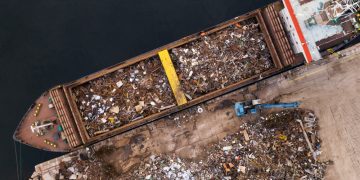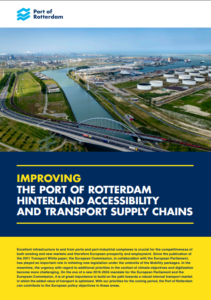As the new European policy period from 2019-2024 is to begin, the Port Authority of Rotterdam presents the port’s key policy priorities for the following years, concerning accessibility and the increase of efficiency of the transport supply chains of the Port.
In the paper, the port provides an overview of their sustainability strategy of different parts of the transport chains, various (future) projects.
- Decarbonization of transport supply chains
Ports are crucial when it comes to supply chains and the transmit of various commodities to and from industrial clusters and consumer areas in the hinterland.
- Increasing operational efficiency
The Port of Rotterdam is in favour of automation and digitalization. An example is the use of the Port Community System which is used for coordination, integration and the exchange of information in across all sectors and between all port users.
- Port call optimization
In addition, the port supports the optimization of port calls, concerning the planning of all operational activities related to vessels calling a port.
- Using alternative fuels in shipping
In the medium term, ships need to switch to electric propulsion, hydrogen and synthetic fuels such as methanol. LNG and advanced biofuels can be used as transition fuels between 2020 and 2050.
- Electrification of transport operations
The port of Rotterdam focuses on the demurrage of the vessels in inland ports, where power and heating for own use is produced through on-board combustion engines, which produces noise and various emissions in the immediate vicinity. So, the port suggests that as fossil fuel production for on-board electricity has lower costs than electricity because it is tax exempted, a level-playing field should be ensured between shore-side electricity vis-à-vis electricity generated on board ships to decarbonize European ports and improve local air quality.
- Optimising the mix of transport modalities
The port plays an important role in optimising the mix transport modes used, to add as much value as possible to the supply chains and reduce externalities at the same time.
Yet, practice shows that modalities are not easy to interchange, because different modes should therefore be seen as complimentary to each other which in combination can offer more efficient transport solutions as the appropriate mode of transport is used for each link of the transport chain
- Inland shipping
Inland waterways are responsible for 45% of the Port of Rotterdam’s hinterland transport. The Port of Rotterdam is therefore committed to a reliable and improved inland shipping product.
inland shipping is under pressure due to the increasing frequency of low and high water levels as a result of climate change.
- Rail freight transport
Freight transport is increasing due to economic growth, and the port of Rotterdam wants to arrange goods flows by rail wherever possible in order to take the pressure off roads and to make a positive contribution to environmental objectives. Rail provides access to important industrial economic regions along the Rhine-Alpine corridor from Rotterdam to Genoa, but also, for example, to the emerging fast-growing markets along the North Sea Baltic corridor.
To explore more, click on the PDF herebelow
































































